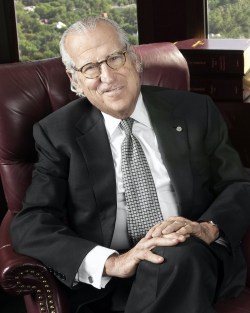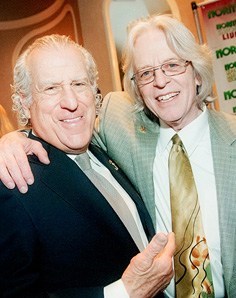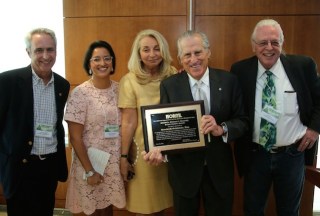
NORML Founder Keith Stroup
For NORML’s 50th anniversary, every Friday we will be posting a blog from NORML’s Founder Keith Stroup as he reflects back on a lifetime as America’s foremost marijuana smoker and legalization advocate. This is the sixth in a series of blogs on the history of NORML and the legalization movement.
Attorney Gerry Goldstein and the Early Years: A Tour of the Texas Prisons, My Bust in Calgary, and “the Pierre Trudeau Defense”
During the 1970s when I was first running NORML, in an effort to extend the impact NORML might have on public policy, I traveled from state to state, wherever and whenever someone was willing to form a new NORML state or local group. During these travels, I was frequently meeting other young lawyers (although we also had many non-lawyers representing NORML around the country), many of whom were also active in the anti-Vietnam War efforts, who shared the NORML position regarding marijuana policy. While privately most of these volunteer supporters were also marijuana smokers, they had to be especially careful to conceal their use in order to avoid being targeted by local law enforcement who might find their pro-legalization advocacy threatening.
In addition, during those years most state bar associations would investigate any allegations that a member of the bar was a marijuana smoker, and would frequently suspend any lawyer from the practice of law for several months or even longer for even a simple marijuana possession conviction. It was considered a moral offense that rendered the individual unqualified to practice law. It required a brave individual with a truly serious commitment to ending marijuana prohibition to assume the risks associated with speaking out as a NORML advocate during the 1970s.
I was fortunate in that my bar license is with the District of Columbia, a progressive jurisdiction that long ago figured out they have more important responsibilities than to worry whether any of their lawyers are marijuana smokers. If one was convicted of a felony for selling marijuana, the DC bar would get involved. But for my simple possession convictions, they have never even made an inquiry.
NORML decided to begin to organize in Texas in the early years because that state seemed especially harsh in the manner in which they treated non-violent marijuana offenses. At the time, Texas sent more people to jail for longer periods of time for minor marijuana offenses than any other state in the nation. Our strategy during those years was to go to the heart of the monster and to focus as much public attention as possible on the victims of marijuana prohibition in an attempt to build public sympathy and to begin to overcome the negative stereotype most Americans then held of marijuana smokers.

Gerry Goldstein
During our first year I became aware of this young San Antonio, TX criminal defense attorney by the name of Gerald H. Goldstein, who practiced in a firm with his father, and who was already doing some important ACLU work and representing anti-war activists in Texas. Gerry and I immediately became friends and he agreed to serve as the early State Coordinator for NORML in Texas, serving as our spokesperson with the media. And when we were approached by some members of the national media asking if we could arrange for them to interview some victims of marijuana prohibition, Gerry was able to arrange an opportunity for us to take the journalists, representing the Associated Press and The New York Times, inside the Texas prison system to meet privately with some hand-picked non-violent marijuana offenders who were currently serving decades-long prison terms. George Beto, then the head of the Texas Department of Corrections, had become frustrated with the influx of young people, many of them students at the University of Texas at Austin, being regularly sent to prison for decades for minor marijuana charges and he thought shinning some light on what was occurring might force some changes in the sentencing practices applied to non-violent marijuana offenders.
When Goldstein contacted Beto to indicate we had a couple of national journalists willing to come interview marijuana prisoners, the warden agreed to assemble a collection of a dozen or so non-violent marijuana offenders and to provide us the space to interview them within the prison. This was an extraordinary offer from the head of the Texas prison system and we knew it was a unique opportunity. In most states, the head of the prison system would likely not even bother returning our calls, and would certainly not help us identify the most attractive victims in the system or allow us to schedule an interview with the national media.
When the date arrived, we found Mr. Beto had delivered on his offer. All of the prisoners were serving multi-year sentences (most multi-decade), and many had been arrested and convicted as young college students, often for selling an ounce or two of marijuana to their fellow college students, never fully understanding the serious risk of prison they were facing until it was too late. It was clear that none of these individuals presented a threat to the public, yet all were looking at a decade or longer in prison.
That prison tour by journalists resulted in both a nationwide AP story that was very sympathetic to our position, and a subsequent New York Times Magazine cover story about NORML and our efforts to help the victims of marijuana prohibition. We were defining ourselves to the general public, and this national media attention helped introduce us as the good guys, working to save these non-violent marijuana offenders from the ravages of decades or longer in prison. And we were challenging the stereotype of marijuana smokers as bad people who needed to be jailed.
As a result of this favorable media coverage, then Texas Governor Dolph Brisco, no friend of marijuana smokers, nonetheless felt the need to establish a commission to review the sentences of non-violent marijuana offenders. This resulted in the eventual early release of scores of non-violent offenders including most, if not all, of those we had interviewed in our prison visit.
One of those young men who was released from prison was Frank Demolli, a former UT college student, who returned to complete his college degree and then became a tribal judge on a couple of Native American reservations in northern New Mexico. Frank, who subsequently became a NORML Life Member, has stayed in touch over the years and recently sent me the following note on the occasion of our 50th anniversary.
Keith, mucho congratulations on the 50th anniversary of your founding of NORML.
In 1971, as Texas Department of Corrections Inmate #224552, and one of 800 Texas marijuana prisoners, we thought you were a god when you appeared on the cellblock with Playboy, ABC, NBC and the New York Times. We couldn’t believe that a long-haired, plain talking, earnest, well-dressed, semi-sortta hippy could get away with changing the Texas marijuana laws which were two-to-life for even one seed.
You did it.
And our sentences were reduced and we can never thank NORML and you enough. May all of you reap the benefits of your good deeds. What has become more wondrous over the decades, is that your entire movement was peaceful.
Love and Peace,
Frank Demolli
Busted in Calgary
So it was only natural that I turned to my friend Gerry Goldstein for help when I was busted going into Canada to give a lecture in 1977.
I did a lot of interstate travel during those years, and frequently I was traveling to a college to give a lecture, to raise funds for the organization and to expand our political network, always trying to leave behind a core group of activists willing to carry the fight forward in their area. And I would generally carry a joint in my coat pocket to share with the students when the lecture was over and the lights turned down for a showing of an edited version of Reefer Madness, which I regularly included as part of my presentation.
But I had not at that time done any international travel and I thought flying to Calgary University in Alberta, Canada to deliver a lecture was the equivalent of going from one state to another; no special security required. As usual, I had a joint rolled in my pocket to share with the students after the lecture, and I was wearing a gold marijuana leaf lapel pin. It sounds terribly naïve now, but I was a true-believer and assumed the righteousness of our cause would somehow always protect us.
And I almost made it through customs when the final officer saw my lapel pin and came back to search my sport coat more carefully, and found the joint. There were students from the university there to pick me up and take me to the lecture hall, and they had to use the lecture fee to bail me out so I could deliver the lecture later than evening. I was given a ticket by the customs officials and assigned a date to return to Calgary for the trial.
I immediately called Gerry Goldstein to ask if he would represent me in Canada and he agreed. We both felt there was very little risk of my going to jail for such a small quantity, so it seemed like a perfect opportunity for a little street theater. We decided to use it as a show trial, at which we would raise the “Pierre Trudeau defense” to illustrate the need to end marijuana prohibition.
Pierre Trudeau was the prime minister of Canada at the time. (His son, who was elected Prime Minister in 2015, enacted legislation legalizing the adult use of marijuana in 2018.) He had been quoted in the Washington Post as saying to young Americans who might want to come to Canada for a visit that they were welcome to bring along a couple of joints, and that they would not be hassled for personal use in Canada! Trudeau always seemed to enjoy contrasting his more progressive policies with the pro-war and anti-pot positions of the US government. He had also made it clear that draft-resisters were welcome to move to Canada
I was never quite sure why Trudeau had made that statement. Perhaps he simply wanted to demonstrate he was not a hypocrite, since it had been widely reported that he and his wife had smoked weed with the Rolling Stones at some point. Regardless, it sure sounded like something that might be useful with my charges in Canada, and it would make good theater for the media.

Gerry Goldstein & Keith Stroup
So, Gerry Goldstein and I returned to Canada for the trial and raised the Pierre Trudeau defense. I took the stand and acknowledged that I had entered the country with a marijuana joint in my coat pocket. We then introduced a copy of the Washington Post article including the Trudeau invitation into evidence, and I testified I had relied on that statement from the prime minister when I brought the joint into Canada.
The judge clearly appreciated the creativity of our defense (and likely saw the humor in what we were doing), so he allowed us to put on our defense. Nonetheless, he ultimately convicted me (there was no jury), imposed a small fine, and sent me on my way home, none the worse for wear.
It turned out we were searched again on the way out of the country, and the Canadian police this time found in a pocket in my shoulder bag (a bag with many little zippered pockets) an empty one-gram cocaine vial, with trace amounts on the sides of the container. Those were the years when cocaine use was relatively prevalent, at least among my circle of friends, but this was a screw-up, not something intentional. Goldstein had warned me to carefully search my bag before we entered Canada, but somehow I had overlooked this one pocket and I was arrested and thrown back in jail.
Fortunately, I was able to stop Goldstein, who was walking a few feet ahead of me, from leaving customs, so he could work that evening to convince the prosecutor this was not intentional, the same one with whom we had just had such fun; and to accept a guilty plea the following morning before the same judge, permitting us to get the hell out of Canada! The judge was obviously angry to be dealing with another drug charge by the same foreign defendant for the second consecutive day, and he imposed another fine and ordered me to immediately leave the country (which, of course, I was only too happy to do). I was advised that I could never again enter the country of Canada, but in fact, after a few years I found those restrictions had been lifted and I have since been to Canada on several occasions without further trouble.
I am well aware that because of my work with NORML and the network of talented criminal defense lawyers who have always worked closely with us, my experiences with the criminal justice system have not been typical. I have had the luxury of treating my two marijuana arrests (the second, at the Boston Freedom Rally in 2007, will be the topic for a subsequent blog) as an opportunity to publicize the unfairness of marijuana prohibition with little, if any, personal risk. The vast majority of individuals who are arrested on marijuana charges in this country (more than 650,000 just last year) still today pay a terrible price in terms of jail or prison time and life-long loss of employment and educational opportunities. For most who are arrested, it is an unfair burden they carry for life.

Gerry Goldstein receives the NORML Michael J. Kennedy Social Justice Award
Goldstein and I have now spent nearly five decades as close friends and professional colleagues. He is a nationally known and highly respected civil rights and criminal defense attorney who has served as president of both the National Association of Criminal Defense Lawyers (NACDL) and the Texas Criminal Defense Lawyers Association (TCDLA). In addition to our work with NORML, we were law partners for a few years in the early 80s. He was an early recipient of the Al Horn Award (1999), given each year to an outstanding criminal defense lawyer in the NORML network; in 2016 he was the first recipient of the Michael J. Kennedy Social Justice Award; and he has been designated by the NORML Legal Committee (NLC) as the Co-Chair for Life (along with San Francisco lawyer Michael Stepanian) for his life-long commitment to ending marijuana prohibition. Those who have attended our annual NORML Aspen Legal Seminars are familiar with the benefit dinners we hold each year at the lovely home Gerry and his wife Christine Goldstein have in Aspen.
Few people have had more impact shaping NORML policies and programs than Gerry Goldstein. He has been willing to speak truth to power his entire career, and he enjoys a little street theater.










